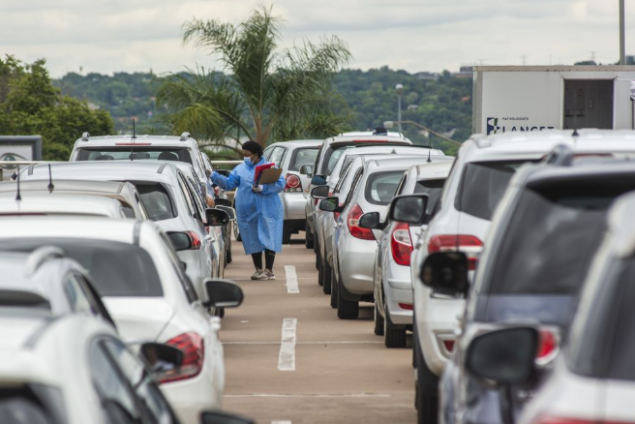A study by South African scientists into the new coronavirus variant driving a resurgence of cases in the country raises concern about the efficacy of vaccines and a new class of therapies.
Half the blood samples taken from a small group of people to have recovered from Covid-19 didn’t have the antibodies needed to protect against the 501Y.V2 strain identified last month, according to the paper by South Africa’s National Institute for Communicable Diseases.
In the other half, antibody levels were reduced and the risk of re-infection couldn’t be determined, according to the institute.
New strains of the virus have also been identified in countries including the U.K. and Brazil, leading to concerns that increasingly dangerous versions of the pathogen still yet to emerge may hamper the global rollout of vaccines.
The lineage recently identified in Brazil “also has changes at key positions” shown in this study to “affect neutralizing antibodies,” the scientists said. “Our data suggest that this lineage is also likely to exhibit significant levels of neutralization resistance, making both lineages of considerable public health concern.”
The NICD findings may “foreshadow reduced efficacy of current spike-based vaccines,” the scientists said.
They also suggest that treatment with plasma from donors who’ve had the coronavirus may not be successful in those with this variant.
The findings weren’t peer-reviewed and were based on samples of 44 donors.
“These data highlight the need for increased, ongoing surveillance and sequencing during the SARS-CoV-2 pandemic,” the authors including Penny Moore, a professor at the NICD, said.
The strain that emerged in South Africa is about 50% more transmissible than earlier versions, Salim Abdool Karim, co-chair of the Covid-19 ministerial advisory committee, said in a presentation earlier this week. However, there’s no evidence it’s more likely to cause hospitalization or death, he said.
Why the Mutated Coronavirus Variants Are So Worrisome: QuickTake
A separate study by Pfizer Inc. and BioNTech SE showed that their Covid-19 vaccine will protect against the new variant of the coronavirus that emerged in the U.K. Scientists have previously said many existing vaccines could be adapted to new strains if needed.
— With assistance by Naomi Kresge
Latest Stories
-
Expansion Drive: Takoradi Technical University increases faculties
3 hours -
SHS heads demand payment of outstanding funds before reopening of schools
3 hours -
We thank God for the 2024 general elections – Akufo-Addo
4 hours -
Coconut Grove Beach Resort marks 30 years of excellence with memorable 9 lessons & carols service
4 hours -
WAFU B U-17 Girls’ Cup: Black Maidens beat Nigeria on penalties to win inaugral tournament
5 hours -
Real Madrid beat Sevilla to keep pressure on leaders Atletico
6 hours -
Liverpool put six past Spurs to go four points clear
6 hours -
Manchester United lose 3-0 at home to Bournemouth yet again
6 hours -
CHAN 2024Q: ‘It’s still an open game’ – Didi on Ghana’s draw with Nigeria
6 hours -
CHAN 2024Q: Ghana’s Black Galaxies held by Nigeria in first-leg tie
7 hours -
Dr Nduom hopeful defunct GN bank will be restored under Mahama administration
7 hours -
Bridget Bonnie celebrates NDC Victory, champions hope for women and youth
7 hours -
Shamima Muslim urges youth to lead Ghana’s renewal at 18Plus4NDC anniversary
8 hours -
Akufo-Addo condemns post-election violence, blames NDC
9 hours -
DAMC, Free Food Company, to distribute 10,000 packs of food to street kids
10 hours

